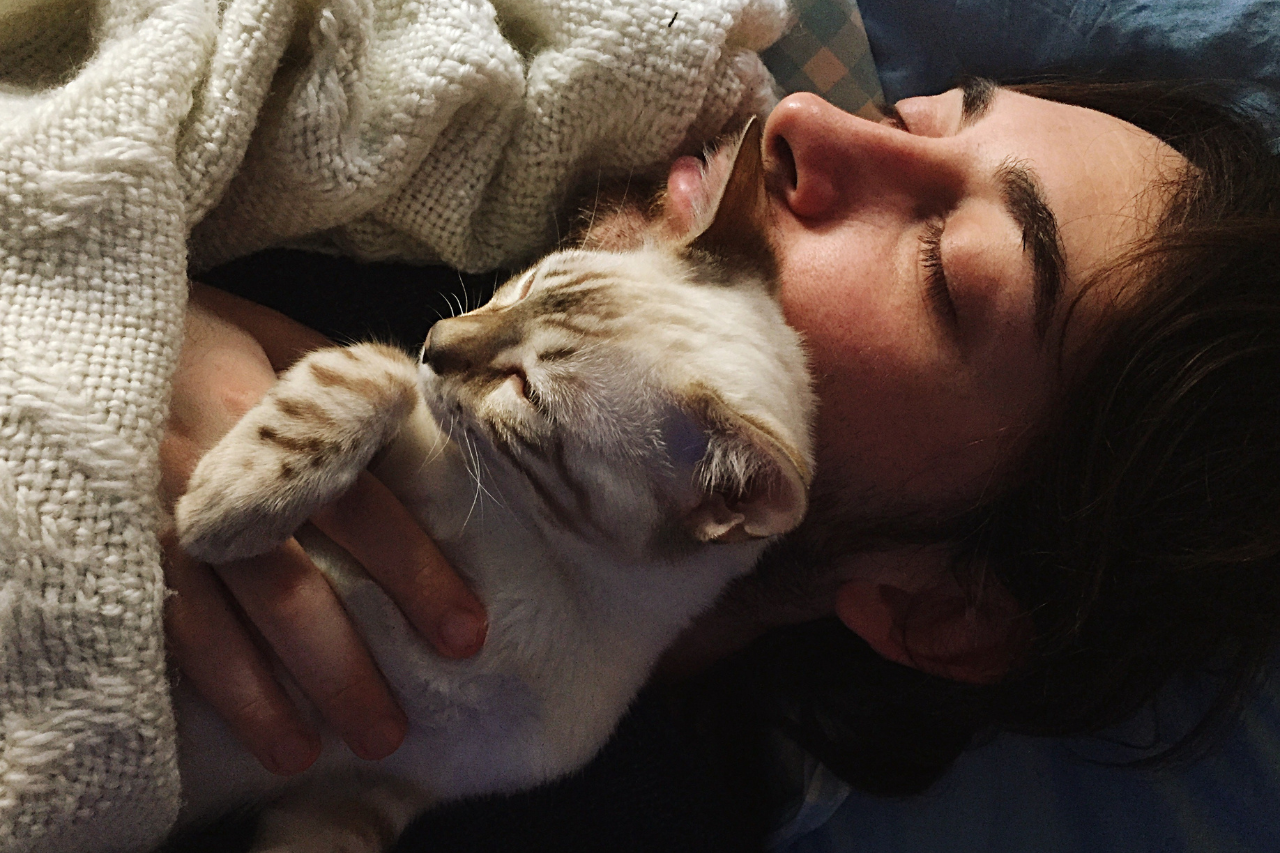

Share:
Cats are undoubtedly one of the most beloved pets around the world. With their charming nature, cats can easily win our hearts with purrs and cuddles. However, it’s important to understand that diseases can be spread between humans and cats if we don’t take proper precautions. In this article, we’ll discuss what diseases cats can give humans and what can be done to prevent the spread of diseases.
There is a range of diseases cats can give humans in various ways.
Common Feline Zoonotic Diseases
Cats can transmit diseases to humans, known as zoonotic diseases. Most of these diseases are caused by bacteria, viruses, parasites, and fungi. Examples of diseases cats can give humans include:
1. Toxoplasmosis
is an infection caused by a parasite found in cat feces or undercooked meat that can cause flu-like symptoms in humans, as well as more serious health issues such as blindness or seizures. To reduce the risk of getting toxoplasmosis from a cat, wear gloves when cleaning a litter box or changing the garden soil and thoroughly cook all meat to kill parasites.
2. Ringworm
can be spread by cats through direct contact with an infected cat or contact with an area where the cat has been. The infection can cause a rash on the skin, scalp, and nails of humans. People should wash their hands after petting cats to prevent spread of ringworm.
3. Bartonellosis (cat scratch disease)
is caused by bacteria found in the saliva of cats. It can be spread through scratches or bites. Symptoms of infection include swollen lymph nodes, fever and fatigue.
4. Salmonellosis
is caused by bacteria that cats can carry in their intestine and shed in feces. Humans can become infected with salmonellosis from contact with a contaminated cat and its environment (e.g., food bowls, bedding).
5. Campylobacteriosis
is caused by bacteria found in the intestines of cats and can cause diarrhea, fever and abdominal cramps in humans. It is spread through contact with a cat’s saliva or feces.
6.Pasteurella multocida
Is a bacteria found in the mouths of cats that can cause skin infections, respiratory diseases, and more serious diseases if left untreated.
7. Parasitic Infections
Cats can transmit parasitic infections such as roundworms, hookworms, and tapeworms to humans through direct contact with the animal or their feces.
To reduce the risk of diseases cats can give humans, make sure your cat is up-to-date on all vaccinations and keep them indoors to reduce exposure to disease carriers such as rodents and other cats. Additionally, practice good hygiene when handling cats and their environment, including washing your hands thoroughly after interacting with them and cleaning the litter box regularly. can give
8. Scabies
Scabies is caused by a type of mite that can transfer to humans from cats. Symptoms include itching, rash and bumps on the skin.
If you experience any of these symptoms after interacting with your cat, contact your doctor immediately for treatment. In addition, if you notice any changes in behavior or health in your cat, be sure to take them to a veterinarian for evaluation and treatment. Taking these precautions can help protect both you and your cat from diseases cats can give humans.
How do I tell if my cat is healthy?
In order to ensure that your cat is healthy, you should watch for signs of diseases they can pass on to humans. Common diseases cats can give humans include Cat Scratch Disease (CSD), Toxoplasmosis, and Ringworm.
Cat Scratch Disease is caused by a bacteria called Bartonella henselae and is spread by a bite or scratch from an infected cat. Symptoms can include fever, swollen lymph nodes, fatigue, headache, and a skin lesion at the site of the wound.
Toxoplasmosis is caused by a parasite called Toxoplasma gondii which cats can pass on through their feces. It can cause flu-like symptoms in humans and can be especially dangerous for pregnant women or those with weakened immune systems.
Ringworm is a fungal infection of the skin, hair, and nails that cats can spread to humans through contact with an infected pet or their environment. Symptoms include itchy patches of red skin, scaly circles on the skin, and loss of hair.
If you suspect your cat is sick, it’s important to take them to the vet right away for diagnosis and treatment. Be sure to practice good hygiene when handling your pet, such as washing your hands after contact with them or their litter box and avoiding direct contact if they seem ill. This can help prevent diseases cats can give humans and keep you and your pet safe.
Can your cat give you a cold?
While cats can’t transmit the common cold, they can spread other diseases through contact with their saliva or feces. It’s important to practice good hygiene when handling your pet and watch for signs of diseases to keep yourself safe.
To sum it up, the diseases cats can give humans include Cat Scratch Disease, Toxoplasmosis, and Ringworm. Symptoms of these diseases can range from fever to itchy patches of skin and loss of hair. If you suspect your cat is ill, take them to the vet as soon as possible for diagnosis and treatment. Be sure to practice good hygiene when handling your pet and watch for signs of diseases to keep yourself safe.
How do I keep my cat healthy?
Keeping your cat healthy involves providing them with a balanced diet, regular exercise, and proper grooming. Additionally, it’s important to provide routine check-ups at the vet and keep their vaccinations up to date. This can help ensure diseases cats can give humans are kept at bay and prevent other diseases from taking hold.
Make sure you’re providing your cat with a stress-free home environment. Offer plenty of opportunities for exercise and play, provide scratching posts and interactive toys, and create hideaways for them to retreat to when feeling overwhelmed or anxious. By taking these steps, you can help keep your cat healthy and reduce the risk of diseases cats can give humans.
Is cat saliva harmful to humans?
Cat saliva can contain bacteria and parasites, which can be harmful to humans if ingested. While there is a low risk of diseases cats can give humans through their saliva, it’s important to practice good hygiene when handling your pet. Washing your hands after contact with them or their litter box can help prevent diseases from spreading. Additionally, avoiding direct contact with a sick pet can help keep you safe.
What are the symptoms of toxoplasmosis in humans?
The symptoms of toxoplasmosis in humans can include fever, swollen lymph nodes, fatigue, headache, and a skin lesion at the site of the wound. It can be especially dangerous for pregnant women or those with weakened immune systems. If you suspect you have been exposed to this parasite, seek medical help right away.
By being aware of diseases cats can give humans and taking preventive steps like good hygiene, routine check-ups, and a stress-free home environment, you can help keep yourself and your pet safe. If you suspect your cat is ill, take them to the vet right away for diagnosis and treatment.
With the right precautions in place, you can enjoy a safe and healthy relationship with your feline companion.
What disease kills cats?
Feline Infectious Peritonitis (FIP) is a viral disease that can be fatal in cats. It is caused by the feline coronavirus, which is relatively common in cats but usually causes only mild symptoms. In some cases, however, it can mutate and cause FIP, which can lead to severe inflammation of the organs, difficulty breathing, and eventually death. Vaccines are available to help protect cats from this potentially deadly disease.
Other diseases cats can give humans and diseases that can be fatal for cats include Feline Leukemia Virus (FeLV), Feline Immunodeficiency Virus (FIV), and Calicivirus. It’s important to vaccinate your pet and take them for regular check-ups at the vet in order to identify any diseases early on and provide proper treatment. This can help ensure a long and healthy life for your cat.
What dangers do cats face?
Cats can face various dangers, both inside and outside the home. Outdoors, cats can be exposed to diseases from other animals, parasites, and traffic accidents. Inside the home, they may be at risk of ingesting toxic substances or being injured by furniture or sharp objects. Additionally, cats are vulnerable to diseases cats can give humans if proper hygiene and safety protocols are not followed.
It’s important to take steps to protect your cat from these dangers, such as providing a safe and secure outdoor area, practicing good hygiene around them, and keeping them up-to-date on their vaccinations. By taking the necessary precautions, you can help keep your cat safe and healthy.
Eating infected rodents
Yes, eating infected rodents is one of the diseases cats can give humans. This can occur if a cat hunts and eats an animal that is carrying diseases such as rabies, toxoplasmosis, or salmonella. These diseases can be passed on to humans through contact with saliva, feces, or urine, so it is important to practice good hygiene when handling cats and their kill.
Additionally, keeping your pet indoors can reduce the risk of them coming into contact with diseases from other animals. By being aware of the diseases cats can give humans and taking proper precautions, you can help keep both yourself and your cat safe and healthy.
Are indoor cats healthy?
Yes, indoor cats can be healthy and live long, happy lives. By keeping your cat indoors, you can help protect them from diseases and other dangers they might face outdoors. Additionally, an indoor environment can provide stimulation for cats through activities like playing with toys or scratching posts.
However, it’s important to make sure your cat is getting enough exercise and mental stimulation to remain healthy. Providing them with a wide variety of toys, furniture, and spaces can help keep your cat active and engaged. Additionally, taking your cat for regular check-ups at the vet can help identify any diseases cats can give humans or diseases they may be susceptible to. With the right precautions in place, indoor cats can be healthy and happy companions.
People with Weakened Immune Systems
People with weakened immune systems, such as the elderly or those undergoing treatment for diseases like cancer, are at risk of developing diseases cats can give humans. As a result, these people should take extra precautions when handling their cats to reduce the risk of infection. They should wear gloves when cleaning litter boxes and wash their hands before and after contact with their pet. Additionally, they should be mindful of diseases their cats may be carrying and talk to their veterinarian about any additional steps they can take.
Eating undercooked meat
Yes, diseases cats can give humans can also be transmitted by eating undercooked meat. This is because raw or undercooked meat can contain parasites like Toxoplasma gondii or roundworms, which can be passed to humans and cause serious diseases.
To reduce the risk of infection, it’s important to follow proper food safety guidelines when preparing meat for your cat. This includes washing surfaces and utensils, cooking the meat to the proper temperature, and disposing of any scraps promptly. Keeping a clean kitchen can help reduce the risk of diseases cats can give humans caused by eating undercooked or raw meats.
Farm Animals
Farm animals, such as cows or sheep can also transmit diseases cats can give humans. These diseases may be transmitted through contact with saliva, feces, urine, or other bodily fluids. To reduce the risk of infection, it’s important to practice good hygiene around farm animals and wear protective clothing when handling them. Additionally, keeping your cat up-to-date on their vaccinations can help reduce the risk of diseases they may be exposed to.
Veterinary Care
Veterinary care is essential for keeping diseases cats can give humans at bay. Regular check-ups can help identify any diseases that may be present and allow the vet to provide treatment before they become a bigger problem. Additionally, making sure your cat is up-to-date on vaccinations can help prevent diseases that are easily spread. By staying on top of your cat’s health, you can help reduce the risk of diseases cats can give humans and keep both you and your pet healthy.
In conclusion
Diseases cats can give humans include Cat Scratch Disease, Toxoplasmosis, and Ringworm. Symptoms of these diseases can range from fever to itchy patches of skin and loss of hair. To keep your cat healthy and reduce the risk of diseases cats can give humans, it’s important to provide them with a balanced diet, regular exercise, and proper grooming. Additionally, keep their vaccinations up to date and give them plenty of opportunities for play and enrichment in a stress-free home environment. Lastly, be sure to practice good hygiene when handling your pet and avoid contact with a sick animal to keep yourself safe.
If you suspect your cat is sick, it’s important to take them to the vet right away for diagnosis and treatment. Doing so can help ensure diseases cats can give humans are kept at bay and prevent other diseases from taking hold.
Most Popular


What is Coffee Bloom and why does it happen?

20 Best Books Made Into Movies And TV Shows

Money Matters: 19 Best Personal Finance Books
Subscribe To Our Weekly Newsletter
Categories
Related Posts

Cute Girly College Ruled Composition Notebooks
Share: In a world dominated by digital tools and apps, the humble college-ruled composition notebook remains a steadfast ally in the quest for productivity. This timeless tool offers unparalleled benefits,

What is Coffee Bloom and why does it happen?
Share: When coffee is ground, the natural oils and aromatics are released. When these coffee grounds are combined with hot water, they create a “bloom” or foamy layer on top

20 Best Books Made Into Movies And TV Shows
Share: Nothing beats a great book-to-movie adaptation. Whether you’re a bookworm who loves to see their favorites brought to life on the silver screen, or a film buff looking for

Money Matters: 19 Best Personal Finance Books
Share: Financial planning is a key element of financial success. It can help you secure your financial future and meet any financial goals you may have. Whether you’re looking to
